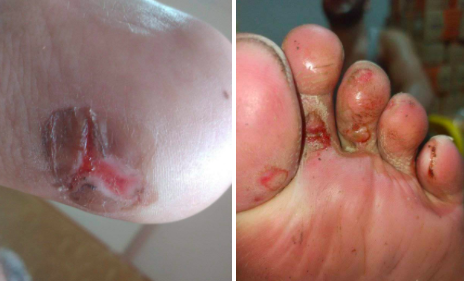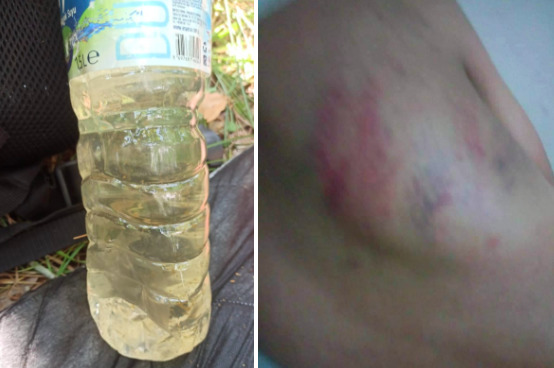The respondent is a 23-year-old man from Syria. He has experienced two pushbacks, the most recent being from Greece to Turkey, around the end of August 2021.
He reported that after crossing the Greek border, together with a group of 10 people, including the respondent’s 14-year-old brother, they were apprehended by uniformed men in Greece. According to him, six of the people in the group got caught, but the respondent, together with two other people and his brother, managed to escape. The group now consisted of four people of Syrian nationality at the ages between 14 to 30 years old. At that point, they reportedly did not have any food and their phones were not charged. The respondent said that after three days, they found a village approximately 10 km east of Komotini, where they could get some food and charge their phones. Here, the respondent believes that the people in the village called the police who came immediately.
The respondent stated that they were approached by three men wearing blue uniforms and with the ‘police’ insignia written on. Their car was reportedly white, also with the ‘police’ insignia. The language they spoke was Greek. According to the respondent’s statement, men in uniforms walked out of the car with batons in their hands, and the first question they asked was “where are your friends?”. After replying that they do not know since their friends got caught, the officers asked for money and their phones, the respondent said. Subsequently, they reportedly searched their bodies and took away their money and their phones.
The respondent reported that, following this, one of the uniformed men sat in the car and two others walked behind it. They made the group of four people also walk behind the car and the men in uniform made sure that they would not escape. The respondent explained that the uniformed men used insulting language against them while pushing them and trying to scare them. According to the respondent, they kept on pushing them until the car eventually passed the village so no one could see them. After this, they were reportedly kicked and violently pushed into the back of the car.
The respondent described that inside the back of the car, it was completely dark and the air was bad. They were driven for what seemed like half an hour to the respondent before they met another white van without any writing on it. The respondent reported that in the middle of a forest, three other men were waiting for them. They have been described as wearing black uniforms without any signs and also as carrying firearms. They reportedly were all wearing black balaclavas and spoke in a different language than Greek. When these officers communicated with the Greek police officers, they spoke in English, the respondent stated. The group was reportedly ordered to take off their clothes and shoes. The interviewee reported that after this, they were beaten and kicked. The respondent explained how they also would hit everyone with batons, including his 14-year-old brother. They reportedly hit the respondent on his legs and his back, and on his younger brother’s shoulder while ordering him to hurry up into the van. According to the respondent’s statement, they told the four people “you are slow, hurry up!”.
After this, they closed the car and started driving. This time, they drove for what seemed five hours to the respondent. He explained that the officers would drive to different spots to look for people who have crossed the border. According to the respondent, their colleagues would then call for them if they had ‘collected’ people-on-the-move that they could come and pick up. The respondent described that eventually, they were 10 people in the car ; all of them were men, Syrians, between 20 and 30 years old plus another minor, close to 15 years old.
“It was so tight and we didn’t have enough space to sit. The officers were driving so fast and they were driving fast on purpose so we would hit each other”.
The respondent said that when he asked them to slow it down, the men driving screamed back and insulted them.
During the long hours of driving, they were not provided any food or water, the respondent reported. They reportedly asked for water when the car stopped, but this only made the officers angry. They also did not have the chance to go to the toilet. According to the respondent’s statement, one person in the car really had to pee, but the officers told him to “just do it inside the car, next to your friends.”
Eventually, they were taken to a detention place around 5 p.m. The respondent explained that this was a place with some buildings without any writing of police or something similar on it. He could not explain what it looked like on the way there, because the windows of the van were completely blurred out. He states that it was in a forest, but you could see the road and a small ‘village’ next to it. The respondent recalled that here, they were put into a big room with seven other people. They were ordered to take off their shoes and socks. The respondent reported that the men in uniform took away their belongings and ordered them to stand next to each other. Here, they would all stand with their hands and faces towards the wall. This lasted for approximately half an hour, according to the respondent. During this time, the respondent said that the people in uniform looked through their belongings. He stated that the 15-year-old boy tried to move and as a consequence the people in uniform beat him hard with the baton. They spoke English to them and they consisted of both women and men.
After half an hour, the people were given back their underwear and they were then put into a cell with another 20 people. They were now 37 people in one room with little space, according to the respondent. The conditions inside the cell were extremely poor – the respondent even reported that he got sick the time he was in there and got an allergic reaction on his skin. He explained that they were all sitting on the floor closely next to each other.
There was one toilet at the end of the cell: “The toilet was really dirty and we didn’t have shoes or slippers, and it was just so bad.” According to the respondent, they did not have access to showers or clean water. They also did not have access to medical support. The respondent explained that after some time in the cell, another four people were pushed into the cell. Their skin was blue and they were screaming from the pain. There was a camera in the cell, and the four people would desperately ask for help and medical assistance towards the camera, but without any luck. They reportedly were also not provided with any food or water during the four hours they would spend inside.
Their fingerprints nor photos were taken of the people inside the detention space. The people in uniform would not even allow the people to speak among them. If someone tried to talk to them, they were insulted and threatened with batons by the people in uniform. For this reason, the respondent was unable to claim asylum.
After sitting and waiting for a long time, the people in uniform came to the cell, started to insult them and ordered them to hurry and go out of the cell. The respondent reported that from here, they were put into two vans, same as the previous ones; white without any writing. They reportedly pushed around 40 people into one van. If anyone did not want to get inside because it was too full, the people in uniform would just beat them and force them inside the van. They drove around 30 to 60 minutes to another detention place where only women and children were waiting. The respondent explained that here, they switched to blue vans and brought the women and children along with them.
Again they drove around 30 to 60 minutes to a big forest and a river. It was dark, around 10 – 10:30 p.m., so the respondent was unable to see any details. In total, the respondent assumed that they were around 80 people; 7 to 9 women and the same amount of children aged 5 to 10 years old. Here, they were reportedly ordered to get on their knees and put their hands around their heads or legs. The respondent reported that the men were still sitting in their underwear – the women were with their clothes.
The respondent could not recall how many people in uniform were there: “I didn’t want to look at them – I didn’t want to get beaten anymore.” In the river, there were only male uniformed people. In addition, the respondent stated that there was a group of 8 people that worked for the police and that the respondent claimed to be Syrians. They were wearing balaclavas. The interviewee described that, as all the people were waiting on their knees, the Syrian group would “unexpectedly, randomly and brutally beat” the people. They inflated two dinghys (plastic boats). They spoke in Turkish to the officers and to the people before they were forced into the dinghys. The respondend explained that two were on the Greek side, two on the Turkish side and four of them transported the people in the boats. In total, they fit 15 people in one boat. While crossing the river, the respondent recalled that they told him in Arabic; “actually we are Syrians. We are working with the police in order to get papers so we can go to Germany and to Europe. That’s what they promised us and that’s why we’re doing this.”
Halfway through the river, the people were reportedly thrown into the water. They were ordered to jump and to swim to Turkey. This included women, children and a lot of people who did not know how to swim. They were not provided with life vests or any other floating objects. The respondent said that many of them were also heavily beaten before they were thrown into the water. The people who knew how to swim would have helped the people who struggled in the water with strong currents.
After this, the respondent and the big group of people eventually arrived on Turkish land. He explained that as they were not provided with water at any time, he had to drink from the river. Still today, a month after the pushback, the respondent feels ill from the water. “You can imagine after 13 days of walking, with no water and without shoes. When I got to the Turkish side, I was just finished.” He struggled with walking without shoes, so it took him 3 hours to reach a village close to Edirne.
From the village, he and his brother managed to call a taxi that brought them to their family in Istanbul.


